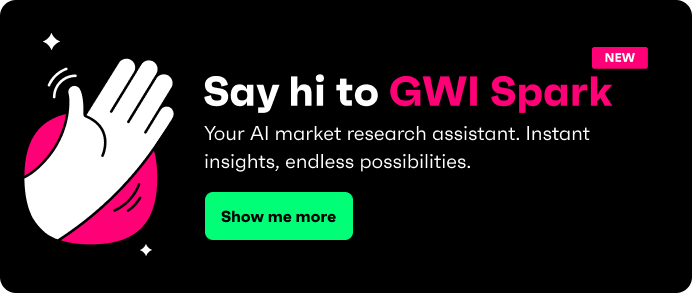
Let’s settle in and chat about AI. It’s powering some of the smartest, most engaging social media strategies, and used by the world’s most switched-on brands.
Audiences now expect faster responses, hyper-relevant content targeted to them personally, whether they’re scrolling their TikTok FYP or looking to invest in a new purchase, and seamless end-to-end experiences. It’s a tall order, so brands are understandably feeling the pressure to deliver at scale. AI can help.
In this guide, we’ll break down exactly how AI is changing the social game, give you the rundown of the AI tools you need to add to your marketing suite to help you stay ahead in 2025. Whether you’re creating, scheduling, listening, or optimizing, we’ve got the scoop on which tools can speed things up and give your strategy a boost.
The role of AI in social media marketing
So, what is AI doing behind the scenes? Let’s unpack how it’s changing the way brands connect, create, and convert on social media.
How AI is transforming social media marketing
First up: the manual grind of the regular tasks of posting and reporting. We’ve all been there.
It often takes more time and effort than you’ve planned for, and can feel like an uphill battle. Using AI to automate these jobs turns guesswork into precision. Plug your raw data into AI and in seconds you’ll have actionable insights.
And personalization? It’s no longer just a nice-to-have - it’s what your audience expects as standard. AI can help you tailor creatives to different audiences, and even recommend what content to serve to different audiences based on user behavior, engagement patterns, and preferences.
Efficiency. Engagement. Stronger ROI. All of these are within reach when you spend a little time getting to know AI. Sounds good, right?
Why brands Are turning to AI for social media success
Let’s start off with an important note - the elephant in the room. AI isn’t replacing marketers, it’s making them more powerful. AI can generate captions, auto-schedule content, track performance in real time, and even learn what your audience wants next. With a fantastic marketer behind the prompts, and making sure the copy that AI creates is on-point for your tone of voice and messaging, you’ve got a perfect team.
But AI tools aren’t just saving marketers time. They’re helping them make smarter, faster decisions. With AI, you’re not just posting and hoping - you’re working off a live pulse of what’s working, where, and with whom.
The best AI tools for social media marketing in 2025
So now we know why investing in AI tools is so important, let’s get into it. What are the best tools available, and how do they stack up against each other? We’ve curated a list of the most powerful AI-powered platforms to elevate your strategy:
AI market research and AI-powered social listening tools
1. GWI Spark
GWI Spark is an AI market research assistant that changes the way brands access and interpret consumer data. By connecting users to real survey data from nearly a million consumers across 50+ markets, GWI Spark gives marketers super-fast, super-actionable insights into audience behaviors and preferences.
Key features:
- Intuitive chat-based interface: Ask complex questions in natural language and receive real-time, actionable insights within a matter of seconds.
- Chart visualizations: In just one click, view the insight in chart format for a more detailed view.
- Pin and copy: Pin insights to save for later, or copy to your clipboard to drop straight into social posts, strategy decks, or reports.
Use cases:
- Uncover insights on your audience’s top platforms instantly, allowing you to focus your time and budget on the right channel mix, and meet your audience where they hang out online.
- Memes or videos? Tailor your social content with quick insights on your audience’s preferred formats so you can hit the mark every time.
Why choose GWI Spark?
Many AI market research tools scrape publicly available data, but GWI Spark has a difference.
It leverages proprietary survey data, making sure you only receive unique, high-quality insights. With this depth of information behind you, you can make informed decisions and craft strategies that truly connect with your audiences.
2. Brandwatch
Brandwatch is a robust consumer intelligence platform allowing brands to monitor and analyze conversations across various digital channels. With real-time monitoring and customizable dashboards, it provides a comprehensive view of brand performance and consumer sentiment.
Key features:
- Real-time monitoring: You’re able to keep track of brand mentions and relevant discussions as they happen, allowing for timely responses and engagement.
- Customizable dashboards: Tailor data visualization to focus on the metrics that matter most to your business objectives.
- Sentiment analysis: Understand public opinion by evaluating consumer sentiment across social media, forums, and other spaces across the web.
Use Cases:
- Brandwatch is strong at monitoring brand health and public perception, so if informing PR strategies and crisis management is your thing, it can help here.
- Analyze competitors' performance and strategies to identify opportunities and threats.
3. Talkwalker
Talkwalker is a consumer intelligence platform offering social listening and analytics to help you understand and engage with your audiences. It focuses on making it easier and faster to gather and share insights, with features like AI-powered segmentation and real-time monitoring. Handy!
Key features:
- AI-powered segmentation: Automatically categorize data to uncover specific audience insights without complex manual processes.
- Real-time monitoring: Access live data to stay updated on brand mentions and industry trends.
- Visual analytics: Utilize charts, pie charts, and other visualization tools to interpret data effectively.
Use cases:
- Identify emerging trends and viral content to inform content creation and marketing strategies.
- Detect potential PR issues early by monitoring sentiment and volume of mentions. Alerted to a massive spike in conversation? You’ll want to look into that.
AI-powered social media content creation tools
Creating great content at scale isn’t easy. In reality, it’s really, really hard. But AI is making it faster, smarter, and can even make it more creative. These tools are designed to help marketers keep feeds fresh, on-brand, and attract - and keep - that all-important, easy to sway attention.
4. Jasper AI
Jasper is built to help generate high-quality, on-brand copy in seconds. Whether you’re writing punchy captions, LinkedIn posts, or longer-form content, Jasper gives you a strong starting point, fast.
Key features:
- Diverse templates: Choose from a wide range of content types, including product descriptions, ad copy, and social posts.
- Tone and brand controls: Keep your content sounding like you, with custom voice and style options.
- User-friendly interface: Designed to be intuitive - there’s no steep learning curve, just type and go.
Use cases:
- Generating social copy that feels fresh, not run-of-the-mill.
- Good for brainstorming content ideas when you’re short on time (or inspiration).
5. Copy.ai
Copy.ai is perfect for short-form content creation - think captions, tweets, ad headlines, and product blurbs. It’s built for speed, creativity, and variety, with tools that help you stay visible without repeating yourself.
Key features:
- Prompt-based writing: Input a few keywords or a product description, and you’ll get back multiple variations to choose from.
- Tools for ideation: From blog title generators to hashtag suggestions, Copy.ai’s all about sparking ideas.
- Flexible output: Tweak tone, format, and purpose with just a few clicks.
Use cases:
- Writing quick-hit copy for campaigns, promos, or launches.
- Generating multiple caption options to A/B test with your audience.
6. Canva AI
No Photoshop skills? No problem. Canva’s Magic Studio brings AI to the world of design - from social posts to presentations, it helps you create scroll-stopping visuals that stay on brand and on time.
Key features:
- Magic Switch and Magic Grab: Quickly repurpose assets or edit images without starting from scratch.
- Brand voice: Generate AI copy that aligns with your brand’s tone, right inside your design.
- AI-enhanced templates: Smarter suggestions help you build out graphics, stories, or slides faster.
Use cases:
- Designing branded content for Instagram, TikTok, or LinkedIn.
- Make more out of existing content by repurposing it into new formats
AI tools for automated social media scheduling and management
When you’re working across multiple social platforms, keeping your social content consistent can feel like spinning plates. These AI-powered scheduling tools are here to simplify that process, make your work faster and smarter, and ensure your posts hit when it matters most.
7. Hootsuite
Hootsuite helpfully brings everything into one place, from post scheduling to real-time audience insights. Its AI features are designed to cut down on manual work and supercharge performance.
Key features:
- OwlyWriter AI: Automatically generate captions, post ideas, and even hashtags based on your brand voice and goals.
- Best time to post suggestions: AI analyzes your audience data to recommend ideal posting windows for max engagement.
- Integrated Canva access: Design visuals without switching tabs. Perfect for quick content turnaround without the fuss.
Use cases:
- Planning and publishing across multiple platforms from a single dashboard.
- Speeding up content production and reacting quickly to audience engagement.
8. Buffer
Buffer is all about ease. It’s designed to make content planning and publishing straightforward, especially for smaller teams or solo marketers juggling multiple channels.
Key features:
- Clean, intuitive interface: You’ll find it easy to schedule and manage posts across platforms without the overwhelm.
- Content calendar tools: Visualize and organize your strategy week by week.
- Performance insights: Light analytics help you see what’s working and make smart tweaks.
Use cases:
- Keeping your social presence active without manual posting every day.
- Collaborating with team members on content ideas and scheduling.
9. Sprout Social
Sprout Social combines scheduling with deep analytics and social listening tools. It’s built for marketers who want a 360-degree view of their brand’s presence and a streamlined way to manage it all.
Key features:
- AI-powered reporting: Understand what’s resonating with your audience and adjust strategy in no time.
- Social listening capabilities: Track mentions, trends, and sentiment to stay ahead of the conversation.
- Unified inbox: Respond to comments, messages, and tags from one place, without the notification chaos.
Use cases:
- Building data-driven campaigns based on real audience insights.
- Managing brand perception and responding to customer needs in real time.
AI chatbots and automated customer engagement tools
Keeping up with DMs, comments, and customer questions? Overwhelming, right? These AI-driven tools help you to engage in real time, automate responses, and most importantly, still sound human while doing it.
10. ChatGPT for social media
Whatever you’ve previously used ChatGPT for (vacation itineraries, anyone?) it can also be an incredibly helpful tool to draft social replies, respond to comments, and even generate content prompts. When integrated with your social tools, it helps automate community engagement while keeping the tone friendly, relevant, and on-brand.
Key features:
- Natural, conversational replies that avoid the “bot voice”.
- Customizable tone and context-aware responses.
- Can be used for brainstorming content, captions, and replies.
Use cases:
- Automate comment responses during busy campaign periods.
- Drafting thoughtful replies to FAQs, product queries, or customer shout-outs.
11. ManyChat
ManyChat is a go-to for Facebook and Instagram automation. It helps engage your followers through chat-based workflows, combining AI with your input to guide conversations, collect leads, and drive sales.
Key features:
- Drag-and-drop chatbot builder for Facebook, Instagram, and WhatsApp.
- Lead capture tools and integrations with email and CRM platforms.
- Templates for common use cases like product inquiries and promotions.
Use cases:
- Automating DMs to handle FAQs, bookings, or product suggestions.
- Running interactive campaigns directly within Instagram Stories or Messenger.
12. Drift AI
Drift is designed for deeper, more personalized interactions, and can be particularly useful for B2B brands. It uses AI to qualify leads, book meetings, and deliver tailored messages based on CRM data and user behavior.
Key features:
- Conversational AI that adapts to user intent.
- CRM and email integration for personalized, data-driven outreach.
- Real-time routing to live reps when needed.
Use cases:
- Turning social traffic into sales conversations.
- Nurturing leads with automated but still personal messages.
AI tools for social media ad optimization
The next tools on our list take the guesswork out of ad performance. With AI helping monitor, tweak, and predict what works best, marketers can run smarter campaigns with better ROI and less manual oversight.
13. Adzooma
Adzooma automates campaign optimization across Facebook, Google, and Microsoft ads. It’s especially useful for small teams looking to stretch their ad spend with intelligent recommendations and automated changes.
Key features:
- Real-time campaign performance insights.
- Automated budget allocation and bid management.
- Performance alerts and suggestions for improvement.
Use cases:
- Managing multiple ad platforms from one place.
- Spotting and fixing underperforming campaigns before they cost you your ever-precious budget.
14. Pattern89
Pattern89 uses AI to forecast which ad elements - think colors, copy, images - will perform best before you even hit the launch button. Great for creative testing and staying one step ahead of audience trends.
Key features:
- Predictive analytics based on historical ad data.
- Creative scoring to assess ad effectiveness.
- Continuous performance optimization.
Use cases:
- Choosing the best creative combo for upcoming ad campaigns.
- Reducing spend on trial-and-error testing.
15. Revealbot
Revealbot helps automate how ads are managed and optimized, working particularly well on Facebook and Instagram. Set rules to pause, boost, or scale ads based on real-time performance, all while you work on other tasks.
Key features:
- Rule-based automation for budgets, performance, and A/B tests.
- Custom reporting dashboards.
- Audience targeting optimization.
Use cases:
- Great for scaling up winning ad sets automatically.
- Reducing wasted spend with auto-pauses on low-performing ads.
AI-powered video and image enhancement tools for social media
Whilst words do the heavy lifting for a lot of marketing content, visuals are everything on social media. These AI tools help you to create content that’s polished, eye-catching, and ready to go viral, without the backing of a full creative team. Reels in a matter of minutes - what’s not to love?
16. Lumen5
Lumen5 turns blog posts, press releases, and even LinkedIn articles into engaging videos for social media. It uses AI to match content with visuals, animations, and soundtracks.
Key features:
- Auto-storyboarding based on your text.
- Built-in video templates and stock library.
- Simple drag-and-drop video editing.
Use cases:
- Repurposing long-form content into bite-sized videos
- Creating explainer or promo videos without a production team.
17. Runway AI
Runway brings professional-level video editing to your browser, powered by AI. It’s used for everything from TikTok effects to full campaign shoots and is great for creators and brands alike.
Key features:
- AI tools for background removal, object tracking, and style transfer.
- Text-to-video generation and motion tracking.
- Real-time collaboration and export options.
Use cases:
- Adding effects or edits to UGC or influencer clips.
- Speeding up video production timelines with automated tools.
18. Deep Dream Generator
Got a need for bold, surreal, or hyper-stylized visuals? Deep Dream Generator uses neural networks to transform ordinary images into viral-worthy art. It’s niche, but when used right, it makes your content really pop.
Key features:
- AI filters that reimagine photos in unexpected, artistic styles.
- Layering tools for texture, contrast, and surreal effects.
- Upload-to-edit interface, no design skills required.
Use cases:
- Creating standout Instagram visuals or campaign art.
- Adding a surreal or artistic flair to brand content.
How AI improves social media marketing strategy
As we’ve discovered, AI isn’t just helping brands work faster, it’s helping them work smarter.
From better targeting to sharper trendspotting and more meaningful, human interactions, here’s how AI is reshaping social strategy from the ground up.
AI for content personalization and audience targeting
Your audience isn’t one-size-fits-all, so your content certainly shouldn’t be either. AI makes it possible to tailor messaging at scale, using behavioral data, preferences, and engagement patterns to create content that actually lands.
From auto-personalized emails to dynamic social ads that change based on who’s watching, AI is what makes hyper-relevance effortless.
AI and predictive analytics: Forecasting trends before they happen
The best way to go viral? Get ahead of what’s coming. AI tools can surface trending hashtags, emerging topics, and shifts in consumer behavior before they break wide, giving you a head start on content that feels fresh, not formulaic.
From beauty brands jumping on skincare trends (glass skin, anyone?) to financial services tapping into crypto chatter, predictive analytics is helping marketers ride cultural waves at just the right moment.
AI doesn’t just track what worked last week. It shows you what’s gaining momentum now.
AI for social media engagement and community building
Community building isn’t just about posting every day - it’s about building real connections with your audiences. AI helps you stay on the ball and ready to dive in, even across time zones and busy campaign periods.
Automated replies keep conversations flowing, AI-generated DMs help scale outreach, and smart tools can even flag comments or interactions worth prioritizing.
And when it comes to partnerships? AI is increasingly powering influencer discovery, helping brands find creators based on engagement quality, niche fit, and audience overlap—not just follower counts.
Social media may be moving fast, but AI helps brands show up, stay consistent, and build stronger digital communities - and, ultimately, your next paying customers.
The future of AI in social media marketing
The tools we’re using now? Despite everything we’ve already discussed, we are just at the beginning of the AI journey.
It’s set to play an even bigger role in shaping how we create, connect, and compete on social media. We’re giving you a glimpse at what’s next, and what you need to keep on your radar.
The rise of AI-generated influencers and virtual creators
Uncanny Valley? Meet the influencers who don’t sleep - or even exist. AI-generated personas like Lil Miquela (a fictional American character, singer and social media personality) are already partnering with major brands, offering a level of creative control and flexibility you don’t get from traditional creators.
These virtual influencers are always on, always brand-safe, and able to engage in totally new ways. In 2025 and beyond, expect to see more brands experimenting with this space, especially as Gen Z and Gen Alpha lean into digital identity and avatar culture.
It’s not about replacing real people. It’s about exploring what’s possible when storytelling and technology collide.
AI’s role in the next evolution of social media algorithms
Social algorithms have passed on from being reactive, they’re now predictive. Platforms are leaning hard into machine learning to decide what content gets surfaced, to whom, and when.
For brands, that means understanding how AI-powered ranking systems work is essential. From content timing and format to sentiment and engagement velocity, every post is up against a complex, ever-learning system.
Staying visible means staying adaptable. The brands that win will be the ones that use AI not just to create content, but to decode how it performs.
Ethical considerations of AI in social media marketing
And here’s the kicker. With great power comes responsibility. As AI-generated content becomes more common, so do the expectations around transparency, authenticity, and ethical use.
Audiences want to know if they’re engaging with a bot, a human, or something in between. And regulators are starting to take notice too.
You need to walk the line - leveraging AI to work smarter, while staying true to their voice and values. Clear labeling, thoughtful implementation, and a strong creative compass will be non-negotiable in the months and years ahead.
Final thoughts
AI isn’t here to take your job. It's here to supercharge it.
Whether you're looking to create sharper content, get deeper audience insights, or just reclaim a few hours in your week, AI tools are fast becoming a must-have in every marketer’s toolkit.
The smartest brands in 2025 won’t just use AI, they’ll use it well. The question isn’t whether you’ll adopt these tools. It’s how fast you’ll get them working for you.





.webp?width=495&height=317&name=pink_thumb_graphs%20(1).webp)
.webp?width=495&height=317&name=pink_thumb_letter%20(2).webp)